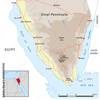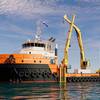An oil storage unit at a power plant in Jiyyeh, 30 km south of Beirut, sustained damage between July 13 and July 15. Precise details of the incident are yet to emerge. Some 10,000 tons of oil escaped and there is potential altogether for up to 35,000 tons to be spilled. The Lebanese coastline 70-80 km north of the power plant – approximately a third of the Lebanese coastline – has been affected. These areas are composed of sandy beaches, rocky beaches, fishing ports and marinas. At the global level, IMO, referring to the International Convention on Oil Pollution Preparedness, Response and Co-operation (the OPRC Convention), is coordinating the international effort to assist Lebanon to respond to the oil spill, in close collaboration with the Joint Environment Unit of the United Nations Environment Program (UNEP) and the Office for the Coordination of Humanitarian Affairs (OCHA), and with the European Commission.
Under the terms of an interface procedure agreement between the two agencies, IMO and UNEP/OCHA will jointly try to identify environmental issues posing the greatest potential impact to human life and welfare. In the meantime, activity is focused on collecting information on the development of the situation and providing technical advice. REMPEC, the center established by IMO and UNEP in Malta to coordinate anti-pollution activities in the Mediterranean Sea, is actively gathering data, as is the Monitoring and Information Center (MIC) operated by the European Commission in Brussels. REMPEC has put the Mediterranean Assistance Unit (MAU) on stand by. An expert from the MAU may be sent to the site to carry out an accurate assessment.
Subscribe for
Maritime Reporter E-News
Maritime Reporter E-News is the maritime industry's largest circulation and most authoritative ENews Service, delivered to your Email five times per week










